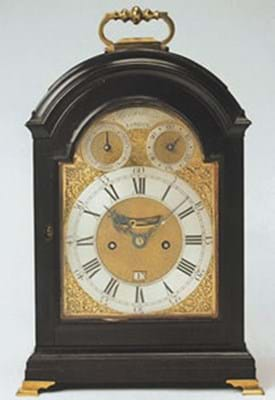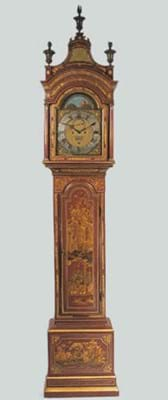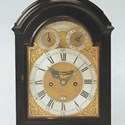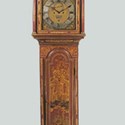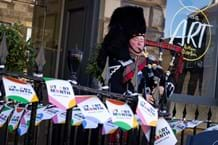Dreweatt Neate, Bristol June 21, Number of lots offered: 533, Lots sold: 70 per cent, Sale total: n/a, Buyer's premium: 17.5/12.5 per cent
Although there was nothing from horology's Premier League, there was enough First Division material to attract both the specialist trade and private buyers - some of the latter no doubt gaining confidence from auctioneer Leighton Gillibrand's comprehensive catalogue notes.
As usual, longcases took most of the higher prices but there was tremendous interest in a George II eight-day bracket clock.
Dated c.1750, it was later than the bracket clocks which have been doing so well in recent months, but at 133/4in (35cm) high, excluding the brass handle, it was a nice size and breathed quality.
The clock, illustrated on this page, had an ebony-veneered (rather than merely ebonised) case enclosing the six-pillar, twin fusee, movement with pull quarter repeat and verge escapement.
The 6in (15cm) brass break-arch dial was signed Benj'n Steele, London whom Britten records as working in 1744.
Estimated at £3000-5000, it sold to a collector at £8200 against a London dealer underbidder.
Mr Gillibrand has seen prices for longcases level off over the past 12 months since their long, and seemingly inexorable rise, but most examples here made their money.
Top seller was the c.1760 red lacquered, eight-day clock illustrated on this page. It was a product of the celebrated partnership of Benjamin Gray, clockmaker to George II, and Justin Vulliamy, who married Gray's daughter and whose son, Benjamin, became clockmaker to George III.
Unusually large at 9ft (2.76m) tall, and with the case decorated with pagodas and sailing vessels, it is believed to have been a special order for the firm.
The fact that the case had undergone some minor restoration to the lacquer may have deterred some of the trade but a knowledgeable private client, who had been looking for a household clock for some time, had to go to a top-estimate £9000 to secure it.
The desire of private buyers wanting the longcase standing in the hall to be a locally made work can be a significant factor at clocks sales and, on this occasion, Dreweatts had sufficient Bristol and West Country timepieces to form a separate section.
Three of these were particularly noteworthy.
Topping the section was a rare William and Mary work by Edward Bilbie of Chew Stoke.
He was known to have been casting bells in 1698 and it is believed that this three-train musical movement, which played tunes every three hours with 12 hammers striking on eight bells, dated to c.1695.
Possibly Bilbie's masterpiece, the 30-hour movement with all its decoration and attention to detail, and the signed 121/2in (32cm) square brass dial survived remarkably intact. However, the 6ft 8in (2.03m) walnut case was almost certainly associated, although contemporaneous with later veneers, which allowed a private buyer to secure it at a mid-estimate £7000.
Another longcase to bring a substantial £3500 for a 30-hour movement was a c.1735 oak-cased rack-striking clock with alarm, signed to the 111/2in (29cm) square brass dial Jn'o Limbry, Currymallet.
Profusely decorated with cast female masks and scrolls to the spandrels, the 6ft 61/2in (2m) tall clock would have undoubtedly fetched much more had it been an eight-day work.
The third local star was a 7ft 61/2in (2.30m) figured mahogany longcase with an eight-day, four-pillar, rack and bell striking movement, signed to the silvered brass break-arch dial Thomas Bullock, Bath.
What made it exceptional was a rocking figure automaton to the arch of a man carrying a bag of flour in a bakery, engraved The Large Bread Warehouse.
Presumably a commission for one of several large bakeries in Bath at the time - possibly even the legendary Sally Lunns - the clock is one of those items which may repay more research time than the auctioneers could give it.
Nevertheless, the catalogue provided enough clues for it to be a target of the Bath trade and a private collector - the latter winning with a bid of £3800.
Cataloguing clocks adds to collectors’ confidence
Longcases sell well after prices hit plateauTHE 530 lots offered at Dreweatt Neate’s Bristol rooms in June covered most areas of the antiques trade with the exception of ceramics, but the sale was always going to be dominated by the strong 44-lot clocks section.

